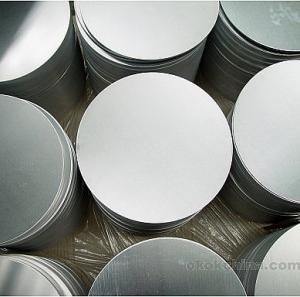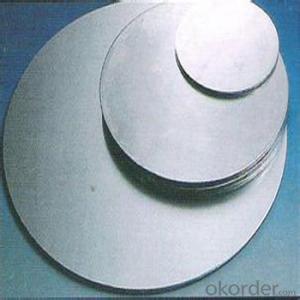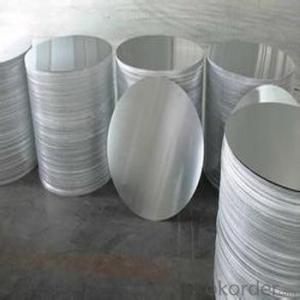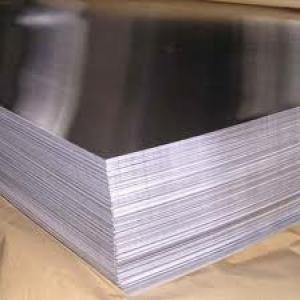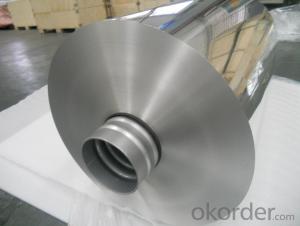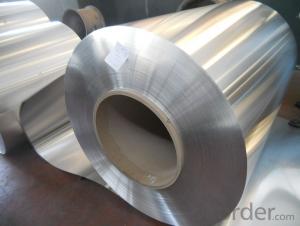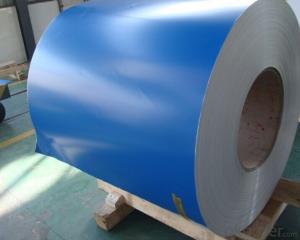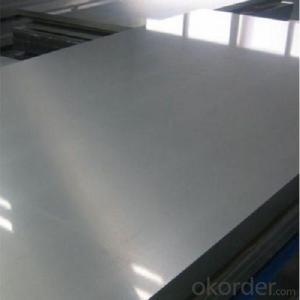Aluminum Circle Aluminum Round Aluminium
- Loading Port:
- Shanghai
- Payment Terms:
- TT or LC
- Min Order Qty:
- 1 m.t.
- Supply Capability:
- 100 m.t./month
OKorder Service Pledge
Quality Product, Order Online Tracking, Timely Delivery
OKorder Financial Service
Credit Rating, Credit Services, Credit Purchasing
You Might Also Like
1.Specification & Description
2.Our advantage
We belong to CNBM group, which is a government owned company, have been in the list of Global Fortune 500 for more than 10 consecutive years.
3.Pictures
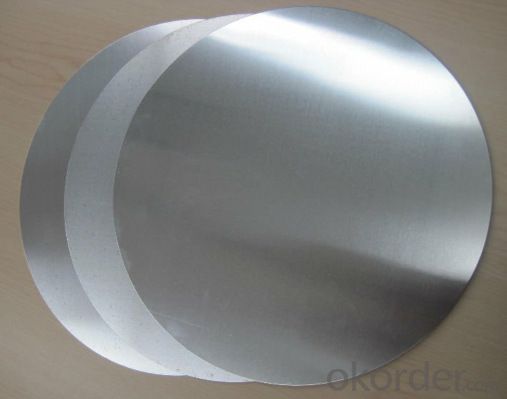
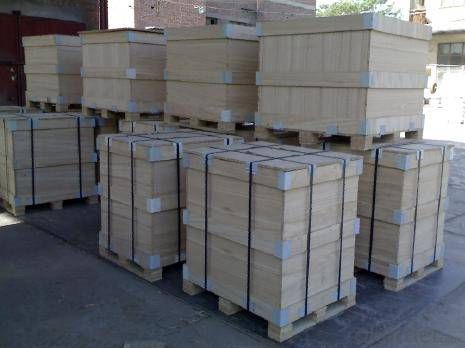
- Q:Are aluminum sheets suitable for architectural louvers?
- Yes, aluminum sheets are suitable for architectural louvers. Aluminum is a popular material choice for louvers due to its various advantageous properties. Firstly, aluminum is lightweight yet strong, making it an ideal material for architectural louvers. It can withstand external forces such as wind and weather conditions without compromising its structural integrity. This is crucial for louvers, as they need to provide ventilation and airflow while also maintaining their shape and functionality. Secondly, aluminum is highly resistant to corrosion and rust. Louvers are often exposed to outdoor elements, including rain, moisture, and sunlight. Aluminum's resistance to corrosion ensures that the louvers will remain durable and long-lasting, even in harsh environmental conditions. Additionally, aluminum is a versatile material that can be easily customized and fabricated into various shapes and sizes. This allows architects and designers to create louvers with unique designs and configurations to suit specific building requirements. Aluminum louvers can be tailored to provide optimal airflow, light control, and aesthetic appeal. Moreover, aluminum is a sustainable and environmentally friendly material. It is widely recyclable, meaning that aluminum louvers can be easily repurposed or reused at the end of their life cycle. Choosing aluminum for architectural louvers aligns with sustainable building practices and contributes to reducing the overall environmental impact. In conclusion, aluminum sheets are indeed suitable for architectural louvers. Their lightweight, strong, corrosion-resistant, and customizable properties make them an excellent choice for louvers in terms of functionality, durability, and aesthetics.
- Q:Can aluminum sheet be used for electrical grounding applications?
- Indeed, aluminum sheet finds utility in electrical grounding applications. It possesses remarkable conductive properties, rendering it apt for employment in grounding systems. Its low resistance and exceptional electrical conductivity make it a common choice in diverse electrical applications. With the capability to proficiently transport electrical current and securely disperse it into the ground, aluminum sheet guarantees the safeguarding of electrical systems and averts potential electrical dangers. Moreover, the lightweight and corrosion-resistant attributes of aluminum establish it as a favored option for grounding applications across numerous industries, encompassing construction, automotive, and aerospace.
- Q:Can aluminum sheets be used for food processing conveyors?
- Indeed, food processing conveyors can make use of aluminum sheets. The numerous desirable properties of aluminum render it a favored option for food processing equipment. Its lightweight nature, resistance to corrosion, and exceptional thermal conductivity make aluminum sheets extraordinarily well-suited for the task of facilitating the transportation of food products within the demanding environment of food production. Furthermore, aluminum's ease of cleaning and maintenance further bolsters its appeal as a hygienic choice for food processing applications.
- Q:What are the different methods of surface treatment for adhesive bonding of aluminum sheet?
- There are several methods of surface treatment for adhesive bonding of aluminum sheet, including mechanical cleaning, chemical cleaning, anodizing, and conversion coating. Mechanical cleaning involves removing dirt, grease, and oxide layers through methods such as sanding, grinding, or brushing. Chemical cleaning uses solvents or detergents to remove contaminants and prepare the surface for bonding. Anodizing forms a protective oxide layer on the aluminum surface, enhancing its resistance to corrosion and improving bond strength. Conversion coating involves applying a chemical treatment to create a thin layer of metal oxide or phosphate, which promotes adhesion between the adhesive and aluminum.
- Q:Can aluminum sheets be perforated for decorative or functional purposes?
- Yes, aluminum sheets can be perforated for both decorative and functional purposes. Perforating aluminum sheets involves creating a pattern of holes or perforations in the metal surface. These perforations can serve various purposes depending on the specific application. For decorative purposes, perforated aluminum sheets are commonly used in architecture and interior design. The patterns of holes can add visual interest and create unique designs, allowing for the play of light and shadow. It can be used for decorative screens, partitions, facades, and ceiling panels, among other applications. Perforated aluminum sheets offer versatility in design, as different hole sizes, shapes, and arrangements can be used to achieve the desired aesthetic effect. In terms of functional purposes, perforated aluminum sheets provide several advantages. Firstly, they can improve airflow and ventilation in applications such as HVAC systems, air-conditioning units, and speaker grilles. The perforations allow air to pass through while still maintaining the structural integrity of the sheet. Secondly, perforated aluminum sheets can be used for sound absorption and noise reduction. The holes in the sheet disrupt sound waves, reducing noise levels in areas such as auditoriums, concert halls, and industrial facilities. Additionally, perforated aluminum sheets have practical applications in filtration and separation processes. They can be used as screens or sieves to separate particles of different sizes, allowing for the filtration of liquids or gases. These sheets are also used in the manufacturing of various industrial equipment, such as vibrating screens, grain dryers, and centrifuges. In summary, aluminum sheets can indeed be perforated for both decorative and functional purposes. Whether it is to enhance the visual appeal of a space, improve airflow, reduce noise levels, or aid in filtration processes, perforated aluminum sheets offer a versatile solution for a wide range of applications.
- Q:Can the aluminum sheets be used for manufacturing power transmission lines?
- Yes, aluminum sheets can be used for manufacturing power transmission lines.
- Q:What are the different methods for perforating aluminum sheets?
- There are several methods for perforating aluminum sheets, including laser cutting, punching, drilling, and waterjet cutting. Each method has its own advantages and is chosen based on factors such as desired hole size, shape, precision, and production volume.
- Q:What is the electrical resistivity of aluminum sheets?
- The electrical resistivity of aluminum sheets is approximately 2.65 × 10^-8 ohm·meter.
- Q:What are the different types of surface treatments available for powder-coated aluminum sheets?
- Powder-coated aluminum sheets offer several options for surface treatments. Among the most common are anodizing, chemical etching, and mechanical finishing. Anodizing involves immersing the aluminum sheets in an electrolytic solution and applying an electric current. This creates a protective oxide layer on the surface, enhancing durability and corrosion resistance. It also provides a decorative finish with a wide range of colors. Chemical etching is another method. It involves applying a chemical solution to the aluminum sheets, creating a textured or patterned surface. This improves aesthetics and allows for unique designs. Mechanical finishing techniques, like brushing or polishing, can also be used. Brushing creates a brushed or linear pattern, while polishing creates a smooth and glossy finish. Furthermore, there are specialized surface treatments for specific applications. Chromate conversion coating improves adhesion of adhesives or paints, while clear coatings offer added protection against UV radiation. Ultimately, the choice of surface treatment depends on the desired aesthetic, functionality, and durability requirements of the application.
- Q:Can aluminum sheets be used for fencing?
- Certainly, fencing can make use of aluminum sheets. Aluminum, being a flexible substance, is both lightweight and long-lasting, as well as resistant to corrosion. It is frequently employed in fencing due to its capacity to withstand severe weather conditions, involving rain, snow, and UV rays. Aluminum sheets can be conveniently transformed into various fence styles and designs, such as picket fences, privacy fences, or decorative fences. Moreover, aluminum fencing necessitates minimal upkeep since it does not rust or decay like other materials including wood or iron. In general, aluminum sheets offer a splendid choice for fencing due to their durability, endurance, and aesthetic allure.
1. Manufacturer Overview |
|
|---|---|
| Location | |
| Year Established | |
| Annual Output Value | |
| Main Markets | |
| Company Certifications | |
2. Manufacturer Certificates |
|
|---|---|
| a) Certification Name | |
| Range | |
| Reference | |
| Validity Period | |
3. Manufacturer Capability |
|
|---|---|
| a)Trade Capacity | |
| Nearest Port | |
| Export Percentage | |
| No.of Employees in Trade Department | |
| Language Spoken: | |
| b)Factory Information | |
| Factory Size: | |
| No. of Production Lines | |
| Contract Manufacturing | |
| Product Price Range | |
Send your message to us
Aluminum Circle Aluminum Round Aluminium
- Loading Port:
- Shanghai
- Payment Terms:
- TT or LC
- Min Order Qty:
- 1 m.t.
- Supply Capability:
- 100 m.t./month
OKorder Service Pledge
Quality Product, Order Online Tracking, Timely Delivery
OKorder Financial Service
Credit Rating, Credit Services, Credit Purchasing
Similar products
New products
Hot products
Hot Searches
Related keywords
